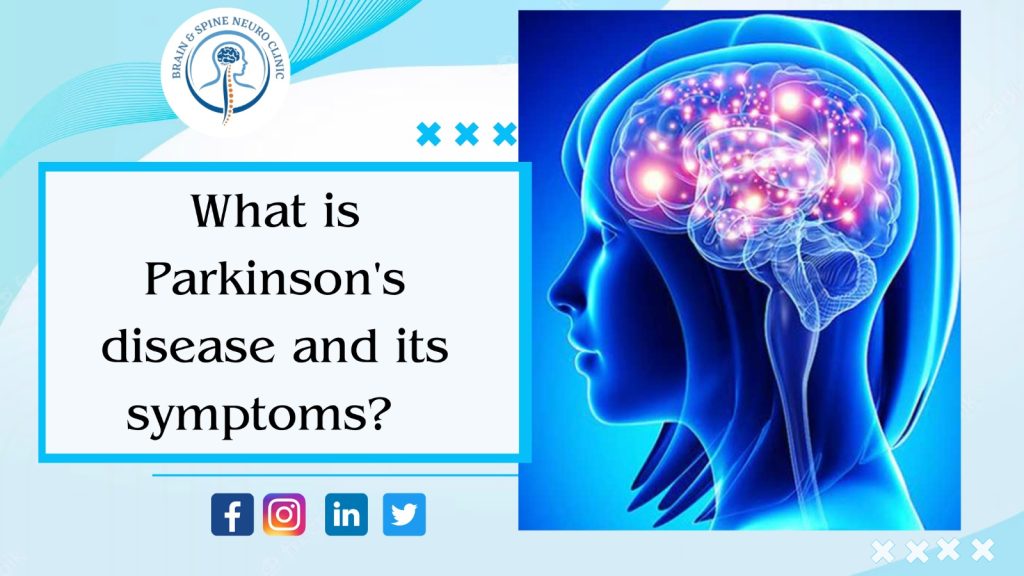Parkinson’s disease is a neurodegenerative condition of the central nervous system, to use more medical terminology.
According to the Neuro Physician Doctor in Greater Noida, A substance called dopamine is often produced by certain brain cells. The areas of your brain that govern movement get messages from dopamine. Parkinson’s disease symptoms begin when 60–80% of the brain cells that produce dopamine are destroyed, and you can have problems moving the way you desire.
Parkinson’s disease is a chronic condition that worsens gradually over time. Parkinson’s disease cannot be cured by therapy or medication, but there are effective treatment choices that can help you lead a full life.
What are Parkinson’s disease’s symptoms and warning signs?
The initial symptoms of Parkinson’s disease may appear gradually and subtly. Not everyone who has the condition will suffer the same symptoms because the disease’s course can vary considerably from person to person. The following are some of the most typical indications of Parkinson’s disease:
Body trembling
One of the earliest symptoms of Parkinson’s disease that many individuals detect is a tremor, which is a shaking or trembling. Tremors frequently start in a limb, frequently in the hand or fingers. For instance, you could notice a tiny tremor in your thumb, fingers, or hand, especially while the affected limb is at rest.
Tremor
A tremor may initially just cause a little trembling in one limb on one side of the body. Body tremors will start to affect both sides of the body as the condition worsens.
stiff limbs and muscles
Parkinson’s disease might make it difficult for your muscles to unwind. Therefore, muscular stiffness may happen everywhere in the body. It might hurt and reduce your range of motion.
Early on, this stiffness could be mistakenly linked to arthritis or another orthopaedic condition.
Slow motion
Parkinson’s disease over time might cause you to move less quickly. This is referred to as bradykinesia and is a typical sign of several movement disorders. Daily activities including getting out of a chair, walking, and talking may take longer or be more challenging due to this disease. You can also lose the capacity to make automatic motions like blinking or smiling over time.
Difficulties walking or balancing
Bradykinesia may also be a factor in developing instability, having trouble walking, and changing gait. A reduction in the natural swing of one or both arms when walking is an early sign of this. You can start to shifting your feet as the situation worsens and your steps get smaller and slower.
Parkinson’s disease sufferers can sometimes have freezing episodes, which can make them feel as though their feet are immobile and raise their risk of falling.
Handwriting alterations
Handwriting changes, notably smaller handwriting, can be a precursor to Parkinson’s disease. Micrographia is a common name for this.
As you become older and your hands or fingers get more arthritic, it’s common for your handwriting to change. However, a neurological ailment like Parkinson’s disease is characterized by handwriting that grows smaller and more confined with time.
Speech modifies
Another often encountered symptom changes in speech and voice. You could talk more rapidly or quietly, or your voice can seem uncertain or slurred. Additionally, your speech may lose some of its natural inflections and become monotonous.
Other symptoms
Parkinson’s disease is classified as a movement condition, but as its symptoms are linked to changes in the brain, it can also cause non-motor problems like:
- Cognitive changes such as memory problems, reasoning
- Difficulties, or difficulty choosing the correct words to use when speaking
- Sleeping issues
- Constipation
- Both anxiety and depression
What triggers Parkinson’s illness?
Some people may get Parkinson’s disease as a result of abnormal genes. However, the condition is not often hereditary. Living in rural regions and exposure to particular poisons like pesticides or herbicides are two environmental risk factors for Parkinson’s disease.
If you are looking for a Parkinson treatment in Greater Noida, consult Dr. Chirag Gupta who has years of experience in managing Parkinson’s disease. Consult now.

